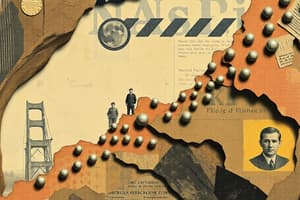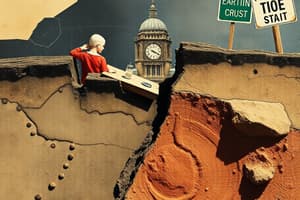Podcast
Questions and Answers
What is the relationship between stress and strain in rocks?
What is the relationship between stress and strain in rocks?
- Stress remains constant regardless of strain.
- Stress is the force that causes strain in rocks. (correct)
- Strain can exist without any applied stress.
- Strain occurs due to released energy from static stress.
Which type of stress is associated with rocks being pulled apart?
Which type of stress is associated with rocks being pulled apart?
- Compressional stress
- Tensional stress (correct)
- Shear stress
- Elastic stress
What type of deformation returns to its original shape after stress is released?
What type of deformation returns to its original shape after stress is released?
- Brittle deformation
- Permanent deformation
- Elastic deformation (correct)
- Ductile deformation
What occurs at the yield point of a material?
What occurs at the yield point of a material?
Which of the following types of strain results in rock fracturing?
Which of the following types of strain results in rock fracturing?
What is the primary factor affecting the deformation of rocks?
What is the primary factor affecting the deformation of rocks?
Which of the following statements about geologic maps is correct?
Which of the following statements about geologic maps is correct?
How are folds classified according to their structure?
How are folds classified according to their structure?
In an anticline, what is the relative age of the rocks located at the center of the fold?
In an anticline, what is the relative age of the rocks located at the center of the fold?
What is the significance of the strike and dip symbol in geology?
What is the significance of the strike and dip symbol in geology?
What determines the direction of strike-slip movement at a fault?
What determines the direction of strike-slip movement at a fault?
Which type of fault feature is associated with compressional stresses?
Which type of fault feature is associated with compressional stresses?
What process explains how energy is released during an earthquake?
What process explains how energy is released during an earthquake?
What is the term for the initial point of rupture during an earthquake?
What is the term for the initial point of rupture during an earthquake?
How does constructive interference affect seismic waves?
How does constructive interference affect seismic waves?
What is a characteristic feature of monoclines?
What is a characteristic feature of monoclines?
Which of the following describes the formation process of a dome?
Which of the following describes the formation process of a dome?
What occurs in a normal fault during tectonic activity?
What occurs in a normal fault during tectonic activity?
What defines a megathrust fault?
What defines a megathrust fault?
Which best describes a basin in geological terms?
Which best describes a basin in geological terms?
Flashcards
Stress
Stress
Force exerted per unit area on a rock.
Strain
Strain
The physical change in a rock caused by stress.
Ductile deformation
Ductile deformation
Permanent change in rock shape after stress surpasses yield point; the rock does not return to its original shape.
Brittle deformation
Brittle deformation
Signup and view all the flashcards
Elastic deformation
Elastic deformation
Signup and view all the flashcards
Pore pressure
Pore pressure
Signup and view all the flashcards
Strain Rate
Strain Rate
Signup and view all the flashcards
Strike and Dip
Strike and Dip
Signup and view all the flashcards
Anticline
Anticline
Signup and view all the flashcards
Geologic map
Geologic map
Signup and view all the flashcards
Monoclines
Monoclines
Signup and view all the flashcards
Blind Faults
Blind Faults
Signup and view all the flashcards
Normal Faults
Normal Faults
Signup and view all the flashcards
Reverse Faults
Reverse Faults
Signup and view all the flashcards
Domes
Domes
Signup and view all the flashcards
Strike-slip fault motion
Strike-slip fault motion
Signup and view all the flashcards
Earthquake focus
Earthquake focus
Signup and view all the flashcards
Elastic rebound theory
Elastic rebound theory
Signup and view all the flashcards
Seismic waves
Seismic waves
Signup and view all the flashcards
Epicenter
Epicenter
Signup and view all the flashcards




